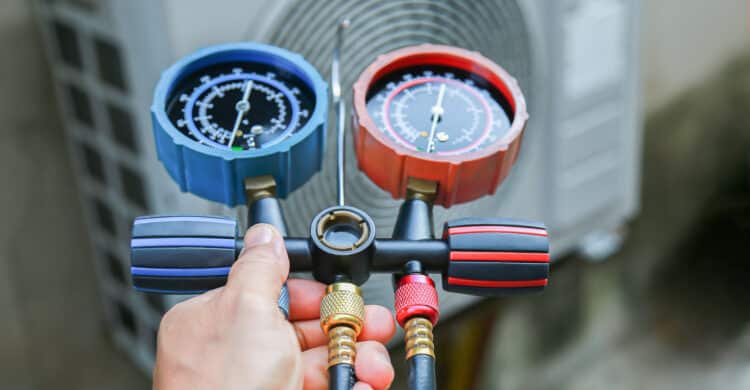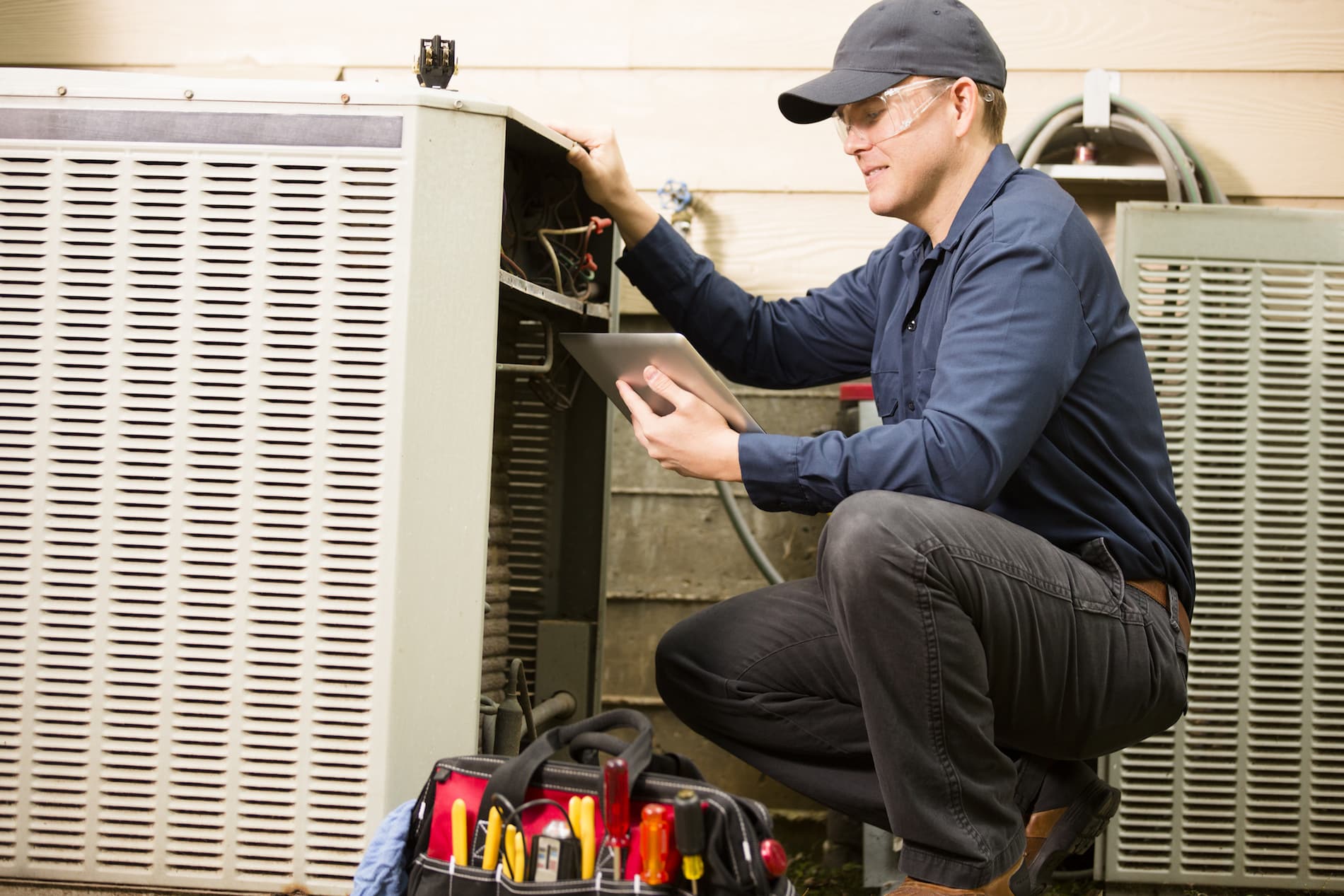
5 Warning Signs Your AC is Low on Refrigerant
Signs Your AC Is Low on Refrigerant
Every summer, homeowners struggle with air conditioners that aren’t cooling properly. One of the most common issues is low refrigerant levels. Here are the key warning signs to watch for:
1. Inadequate Cooling
If the AC is blowing warm air or struggling to keep the home cool, that’s a significant red flag. The air conditioner’s primary job is to condition the air, and if it’s not doing that, something is wrong. Often, low refrigerant is the culprit behind this inadequate cooling performance.
2. Longer Run Times
When the AC is low on refrigerant, it has to work overtime to cool the home. This results in longer run times, noticeable as the air conditioner running constantly without ever reaching the desired temperature. This isn’t just annoying—it’s also hard on the AC unit. The longer it has to run, the more wear and tear it experiences, increasing the chances of a breakdown. If the AC is running longer than usual, don’t ignore it.
3. Higher Energy Bills
Those longer run times come with a cost, and that cost shows up on energy bills. When the air conditioner is running more often and for longer periods, it’s using more electricity. A sudden spike in cooling costs without a corresponding heat wave or change in usage habits could indicate low refrigerant. This forces the AC unit to work harder than necessary, leading to higher expenses.
4. Ice Buildup on Evaporator Coil
Ice on the air conditioner during summer might seem counterintuitive, but it’s a common sign of low refrigerant levels. When refrigerant is low, pressure drops in the evaporator coil, causing it to get much colder than normal. Any moisture in the air that comes into contact with the coil can freeze. If ice or frost is seen on refrigerant lines or the evaporator coil, turn off the AC immediately and call a professional. Running the air conditioner in this condition can cause severe damage.
5. Hissing or Bubbling Noises
Unusual noises from the AC unit, such as hissing or bubbling sounds, could indicate a refrigerant leak. A refrigerant leak can significantly impact the AC’s cooling power and pose health risks. If a leak is suspected, call an HVAC professional right away to address the problem.
Common Causes of Low Refrigerant in Air Conditioners
Low refrigerant levels in air conditioners can stem from several common causes:
Refrigerant Leaks
The primary cause of low refrigerant levels is leaks. An air conditioner operates as a closed system, so refrigerant should never need to be topped off or replaced unless there is a leak. Leaks can occur in various parts of the system, such as the evaporator coil, condenser coil, or refrigerant lines. These leaks can result from everyday wear and tear, accidental damage, or even manufacturing defects.
Improper Installation
Improper installation is another potential cause of low refrigerant. If the AC unit was not installed correctly, it could have been operating with an insufficient refrigerant charge from the start. Skimping on professional installation might save money initially, but it can lead to significant problems and costs later. Proper installation is crucial to avoid issues like refrigerant shortages.
Insufficient Refrigerant Charge
Even if the AC unit was installed properly, it might not have been charged with the correct amount of refrigerant. Each air conditioner is designed to operate with a specific refrigerant charge, and being undercharged from the beginning can lead to various problems.
Age and Wear
Over time, air conditioning systems become more prone to developing small leaks and losing refrigerant charge. Regular maintenance is essential to catch these issues early and prevent major problems or breakdowns.
Consequences of Running an AC with Low Refrigerant
Running an air conditioner with low refrigerant can lead to several issues:
Reduced Cooling Efficiency
An AC with low refrigerant won’t cool the home effectively. The refrigerant enables the system to remove heat and humidity from the air, so low levels impair this process. Signs include a lack of cool air from the vents, uneven cooling, and an AC that runs constantly without reaching the desired temperature.
Increased Energy Consumption
When an AC struggles to cool due to low refrigerant, it works harder and runs longer, consuming more energy. This results in higher energy bills without an improvement in comfort.
Strain on AC Components
The extra work puts a strain on the system’s components, particularly the compressor. Overworking the compressor can cause it to overheat and fail, which is one of the most expensive AC repairs. Often, it’s more cost-effective to replace the entire unit than to fix the compressor.
Potential System Breakdown
In the worst-case scenario, running an AC with low refrigerant can lead to a complete system breakdown. This can happen when the compressor fails or other components are damaged due to the added strain. A breakdown during a heatwave can lead to dangerously high indoor temperatures.
The bottom line? Low refrigerant is not a problem you can afford to ignore. The longer you run your AC with insufficient refrigerant, the higher the risk of serious damage and costly repairs. If you suspect your system is low on refrigerant, the smartest thing you can do is turn it off and call a professional right away. It might feel like an inconvenience in the short term, but it can save you a world of discomfort (and a small fortune) in the long run. Your AC – and your wallet – will thank you.
Detecting Refrigerant Leaks in Your Air Conditioner
Refrigerant leaks in air conditioners can be tricky to spot without knowing what to look for. However, catching a leak early can save significant headaches and money. Here are some key ways to detect these elusive leaks.
Visual Inspection
A visual inspection can reveal signs of oil or moisture around the refrigerant lines, evaporator coil, and condenser coil. Oil is carried along with the refrigerant, so oily residue can indicate a leak.
Leak Detection Tests
Technicians use advanced leak detection equipment to pinpoint the exact location of leaks. Tools like electronic sensors, UV dye, and nitrogen pressure testing make it easier to identify and fix leaks.
Professional Diagnosis
If low refrigerant or a leak is suspected, professional diagnosis is essential. Technicians have the tools and expertise to accurately diagnose and address the problem, ensuring the AC operates efficiently. Regular maintenance and prompt leak detection help keep the system in good condition for years to come.
Ignoring low refrigerant issues can lead to significant discomfort and costly repairs. If any of these problems are suspected, it is wise to seek professional help immediately.
Steps to Take When You Suspect Low Refrigerant
Alright, so you’ve noticed some warning signs that your AC might be low on refrigerant. Now what?
Turn Off the AC
First and foremost, turn off your air conditioner as soon as you suspect low refrigerant levels. Running an AC with insufficient refrigerant can cause serious damage to the compressor and other components.
Contact a Professional HVAC Technician
Time to bring in the big guns – your friendly neighborhood HVAC technician. One call is all it takes for them to swoop in, diagnose the issue, and repair any leaks faster than you can say “cool and comfortable.”
Schedule Repairs
Once the technician has assessed the situation, they’ll recommend the necessary repairs. This may involve sealing or replacing damaged components, recharging the system with the correct amount of refrigerant, and testing everything to ensure proper operation.
Conclusion
Being aware of the signs your AC is low on refrigerant can help catch the problem early. If there’s suspicion of low refrigerant, professional help is essential to avoid serious damage and costly repairs.
Conditioned Air Systems can provide the expertise needed to diagnose and fix refrigerant issues. With proactive maintenance and timely intervention, the AC can continue providing cool comfort all summer long.
Stay Cool and Comfortable All Summer Long

